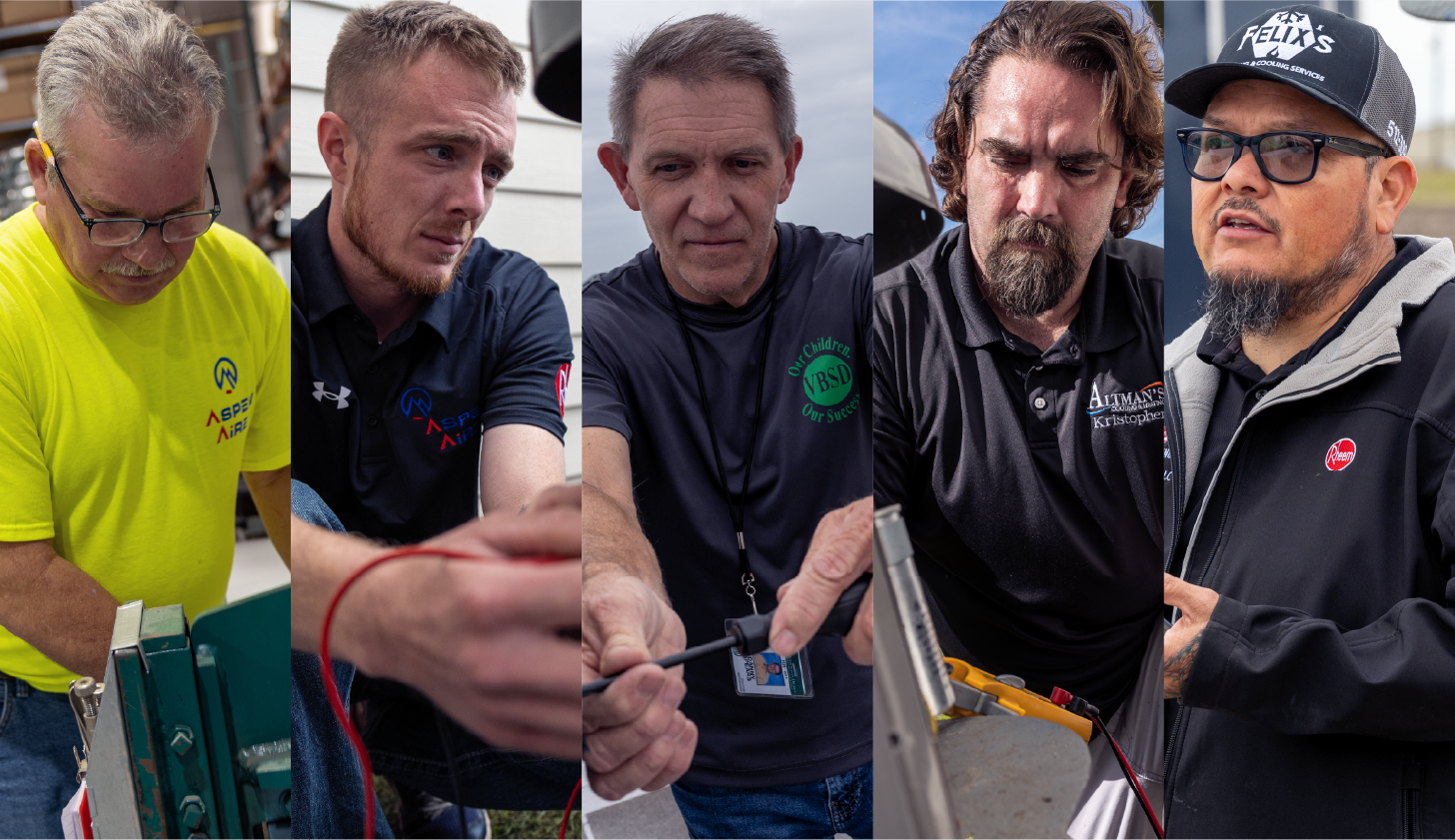Top Water Heater Options for Cold Garages and Unfinished Basement
October 28, 2025


Water Heater Options for Unfinished Spaces
Installing a water heater in an unconditioned space like a basement or garage comes with challenges like low ambient temperatures that can impact performance. Whether you’re considering a heat pump, tankless, or traditional tank model, we’ll walk you through how to choose an energy-efficient water heater that works reliably, even in the coldest parts of your home.
Which Water Heater Types Work Best in Cold Garages and Basements?
Not all water heaters are built to perform well in unconditioned or chilly spaces. Before choosing a model, it’s important to understand how each technology handles colder ambient temperatures and what that means for your comfort and energy bills.
Heat Pump Water Heaters Designed for Efficiency: Hybrid electric heat pump water heaters are highly efficient units that extract heat from the surrounding air (even cool air) and use it to heat your water. In very cold conditions, a homeowner can switch to High Demand mode where its built-in electric heating elements turn on to ensure you still get hot water, even when the air isn’t warm enough for the heat pump alone to do the job. Additionally, they can provide a bit of dehumidification and cooling to the surrounding space, which can be helpful in a damp garage or basement. So, while it is important to note that during the coldest months, you may need to trade some efficiency for performance by using High Demand mode, heat pump water heaters are still a very economical and efficient choice for year-round water heating.
Thinking a heat pump might be right for you? Explore Rheem Heat Pump Water Heaters.
Electric Tank Water Heaters: For simplicity and reliability, electric tank water heaters are solid performers when installed in a garage or unfinished basement. They don’t rely on ambient air temperature to operate, so their performance remains steady regardless of how cold it gets around them. While they are not as energy-efficient year-round as heat pump water heaters, they’re predictable, affordable to install, and generally low-maintenance.
Gas Tank Water Heaters: If you have access to natural gas, a gas tank water heater can be another effective option. These models heat water quickly regardless of ambient temperatures. They’re a great fit for cold climates, but you’ll want to be sure you follow local ventilation and safety requirements when installing one in a garage or basement.
Tankless Water Heaters: These units are compact and perfect for tight spots like closets. Both electric and gas models are available, and they deliver continuous hot water on demand. For homeowners with limited space, tankless units can be a smart fit. You’ll also need to ensure your home has the right electrical or gas infrastructure to support the system, particularly for whole-house use.
For a great fit in tight spaces, check out Rheem tankless water heaters.
Which Features Should You Look for in Water Heaters for Unfinished Spaces?
In garages and unfinished basements, a few specific features can make a big difference in both performance and longevity.
Insulated Tanks and Piping: If you’re installing in an unheated area, insulation is your best friend. Look for water heaters with extra tank insulation and consider insulating your hot water pipes as well. This helps reduce standby heat loss, keeping your system more efficient over time.
Backup Heating Elements: This is especially important in hybrid heat pump models. When the ambient air is too cold for the heat pump to operate efficiently, these backup elements step in and ensure you still get reliable hot water when you need it.
Durability and Warranty: Cold, unfinished spaces can be a little rougher on appliances. Look for water heaters made with corrosion-resistant tank linings and long warranties.
Space and Installation Constraints: Since garages and basements aren’t always roomy, a compact water heater or a model with flexible venting and installation options can make life a lot easier in tight or awkward spaces.
Be sure to check out Rheem’s Tank Water Heaters, built for reliability and ease of installation.
When Is a Heat Pump Water Heater a Good Choice for Cold Garages or Basements?
Does cold weather affect water heaters? Yes, but not always in ways that should rule out efficient options. Heat pump water heaters can absolutely be used in colder spaces, but they do have some specific environmental needs to operate well.
A heat pump water heater is a great fit for a cold garage or basement if:
- The ambient temperature in the space generally stays above 37°F.
- There’s enough room for airflow around the unit.
- You’re looking to maximize energy efficiency and lower utility costs.
- You wouldn’t mind a little added cooling or dehumidification, especially in the summer months.
These systems shine when conditions are right. See how a Rheem Heat Pump Water Heater can work for your home.
FAQ: Water Heaters for Cold Garages and Unfinished Basements
Q: Can heat pump water heaters work reliably in cold garages?
A: Yes, many hybrid models are designed to work efficiently in spaces as cold as 37°F. Below that, they switch to electric backup heating.
Q: Should I insulate my water heater and pipes in an unfinished basement?
A: Absolutely. Insulating the tank and pipes helps prevent heat loss and can keep your system running more efficiently in unheated areas.
Q: Are tankless water heaters a good fit for basements?
A: They can be. If your basement has enough gas or electric supply, tankless models are great space savers and deliver hot water on demand.
Q: Can a water heater freeze in a cold garage?
A: It’s possible, especially in very cold climates. To prevent freezing, ensure proper insulation on pipes, choose a model rated for cold environments, and consider installing a unit with built-in freeze protection.
Q: What’s the best way to install a water heater in a basement or garage?
A: The best approach depends on your fuel source, space, and climate. Work with a professional installer who understands how to size and position the unit for efficiency and reliability in unconditioned spaces. Find a Rheem Pro near you.
People Also Ask…
What’s the difference between a regular and a hybrid water heater?
A standard electric water heater uses resistance heating to warm water, while a hybrid electric heat pump water heater pulls heat from the surrounding air, using much less energy. Hybrid models can reduce energy use and often pay for themselves quickly through lower utility bills. Learn more in Rheem’s blog post: What Is a Heat Pump Water Heater?
How can I monitor a Rheem water heater remotely?
You can download the Rheem EcoNet® app on your phone to stay in the loop. This is helpful for managing temperature, reviewing available hot water, tracking energy use, and receiving alerts without needing to physically access the unit.
How do I prepare my water heater for winter?
To protect your water heater in cold weather, insulate exposed pipes, check for any drafts around the unit, and make sure freeze protection settings (if available) are enabled. For garage or basement units, these steps are especially important to avoid costly damage or downtime. Learn more in Rheem’s blog post: Winter Prep Tips for Water Heating Systems.
Choosing the Best Water Heater for Cold Garages and Basements
When it comes to cold garages or unfinished basements, the best water heater is one that can handle low temperatures without sacrificing reliability. Hybrid heat pump water heaters are becoming more popular since they are efficient, environmentally friendly, and work well in many spaces. But no solution is one-size-fits-all. Your home’s layout, ambient conditions, fuel sources, and installation space should all play into your decision.
Start by assessing your space and your goals. Then, compare models with features designed for cold weather resilience.
Ready to take the next step? Explore Rheem Water Heater Solutions.







